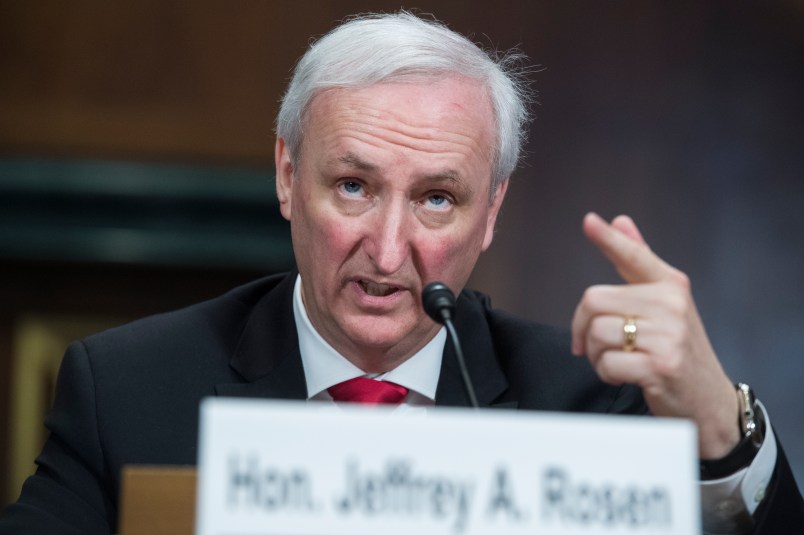Former acting Attorney General Jeffrey Rosen stonewalled a House Oversight Committee hearing on the Jan. 6 Capitol insurrection, citing privileges that nobody had claimed in a bid to avoid discussing what former President Trump asked of him as he sought to overturn the results of the 2020 election.
Among other things, Rosen refused to describe the contents of his conversations with Trump before Jan. 6, including what the former president asked him to do during a White House meeting on Jan. 3.
Rosen also declined to describe what took place on Jan. 6 as an “insurrection,” instead saying he found the events “abhorrent.”
Trump and Rosen met in the White House on Jan. 3. At around the same time, Trump was reportedly entertaining a bizarre plot to install another DOJ official, Jeffrey Bossert Clark, in Rosen’s place. Clark reportedly told Rosen that the election results would be overturned.
In prepared remarks for the hearing, Rosen emphasized that under his tenure as acting attorney general, the Department of Justice did not “participate in any campaign’s or political party’s legal challenges to the certification of the Electoral College votes” and supported “an orderly and peaceful transfer of power under the Constitution.”
“The only time DOJ did file a brief, it was to seek a dismissal of Representative [Louie] Gohmert’s lawsuit aiming to decertify the electoral count — and that lawsuit was dismissed, as DOJ had urged,” Rosen wrote.
But in his live appearance Wednesday, Rosen offered less information than he did in his prewritten opening statement. In one exchange, Rep. Gerry Connolly (D-VA) asked Rosen multiple questions about the Jan. 3 meeting, to which Rosen offered a vast array of excuses as to why he could not answer.
At first, he implied that it was his role as a lawyer that gave the conversation secrecy.
“Respectful, I understand your interest in the issue and I’ve been trying to be as forthcoming as I can,” he said to Connolly. “When you ask me about communications with the president, I, as a lawyer, don’t get to make the decision on whether I can reveal a private conversation on that — other people make that decision and I’ve been asked today to stick to the ground rules I have.”
A few answers later, he made it sound like the conversation was private due to executive privilege. It’s unclear to what privilege Rosen may have been referring.
“I don’t think it’s my role here today to discuss communications with the President in the Oval Office or White House without authority to do that,” he said.
Connolly noted that Rosen had not formally invoked executive privilege, also a rather flimsy argument given that Rosen is no longer AG and Trump is no longer president.
Rosen then brought up an inspector general investigation as an obstacle in response to a question about Trump DOJ official Clark’s alleged attempts to use the DOJ to overturn the election. That effort reportedly centered on a plan to remove Rosen and replace him with Clark.
But even for that, Rosen kept mum.
“That episode is the subject of an inspector general investigation,” he said.
Finally, he concluded that he could not stray from “ground rules” decided by his counsel, the Department of Justice and the committee before his testimony.
A fed-up Connolly ran out of time, using his last few moments to “disavow” comments made during the hearing by Republicans seeking to muddy what happened on January 6.
“Rewriting history serves no purpose other than to cover up the violence and brutality that we experienced and that was exhibited on January 6 — a shame for America, a shame for this Congress,” he said.







So Rosen thinks he has no obligation.to reveal that Trump asked him to commit crimes? Spent a lot of time pointing out that the DOJ did not participate in phony challenges to the election results. This is something we should be able to take as a given, not some special display of courage we should be grateful for. If he was under pressure to take illegal.actions he has a right and a duty to tell us.
Your photograph of Jeffrey Rosen at the top of this article has a major error. Jeffrey Rosen is in no way Honorable.
So we are back the Trumper Schrodinger’s Cat interpretation of Executive Privilege: where they are not formally invoking it (cause only the President can do so), but they can’t answer the question because the President could invoke it in the future.
Apparently, the fact that the President-in-question is no longer President and, therefore cannot actually invoke Executive Privilege anymore, makes no difference to the logic.
In Georgia, such discussions are, themselves, felonies. I should think that’s true in other jurisdictions, as well. Failure to tell appropriate authorities about it would be misprision of a felony, which is also a felony.
Did anybody expect Jeffrey Rosen to testify candidly?
There was a reason that all of the manipulation went on to maneuver Rosen into the position of acting Attorney General - and it was because he would willingly implement any and all elements of what ever conspiratorial schemes that Trump desired … and would behave not like the Attorney General of the United States - nope - he would behave like he was a personal attorney with loyalty only to Donald J. Trump.
There will be NO honest answers provided by Jeffery Rosen.